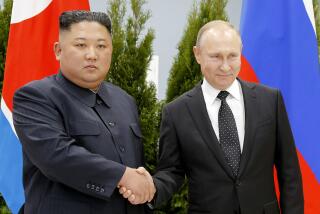Team to Assess N. Korea Famine
- Share via
WASHINGTON — North Korea, one of the world’s most secretive and closed societies, will allow a U.S. government team to visit for a firsthand assessment of a worsening famine in the country, the Clinton administration said Monday.
The regime’s decision to admit the inspection team, which will arrive Saturday, suggests that North Korea has decided to bend a little to get the donated food needed to alleviate the country’s spreading hunger.
“The United States regards the food situation in North Korea as very serious,” State Department spokesman James P. Rubin said. He stressed that the goal of the inspection, the first official one by a U.S. government team, is to make sure that food is not being diverted to feed the country’s million-member army.
The seven-member U.S. team will be headed by Leonard Rogers, an administrator for the Agency for International Development, or AID.
Rubin also said that North Korea has agreed to admit additional monitors from the World Food Program, apparently ending a standoff that had caused some countries, including the United States, to balk at sending large quantities of food to the country.
The U.S. already has agreed to send 195,000 tons of grain, one of the largest single contributions but a relative drop in the bucket in comparison with the need.
Representatives from the State Department, the Centers for Disease Control and Prevention, AID and other agencies will be on the Rogers team. Although they are the first U.S. government representatives to officially assess the North Korean famine, Rep. Tony P. Hall (D-Ohio), Congress’ leading expert on hunger, visited the country last week.
“We are hoping in the next day or so to be able to talk with Congressman Tony Hall,” Rubin said. “We did have a Department of State official accompanying him, and we will be getting a readout from our people, as well as directly from Tony Hall about what he saw, what he thought and what he learned.”
Rogers said recently that the United States will not increase its contributions unless there is an effective monitoring system to make sure that the food is distributed to the hungry.
*
Rubin said the World Food Program and North Korea have resolved a dispute that had limited the U.N.-affiliated agency to seven of the 17 inspectors it said it needed to monitor the food distribution.
“We have made clear to the North Korean government the importance of having monitoring, and I believe that some of the concerns that were expressed were resolved, in terms of people getting the necessary visas,” Rubin said.
Even in the best of times, North Korea is able to produce less than half the food it needs. That situation has been worsened by floods, drought and a typhoon, as well as loss of subsidies after the collapse of the Soviet Union.
*
* RELATED STORY: A6
More to Read
Sign up for Essential California
The most important California stories and recommendations in your inbox every morning.
You may occasionally receive promotional content from the Los Angeles Times.













